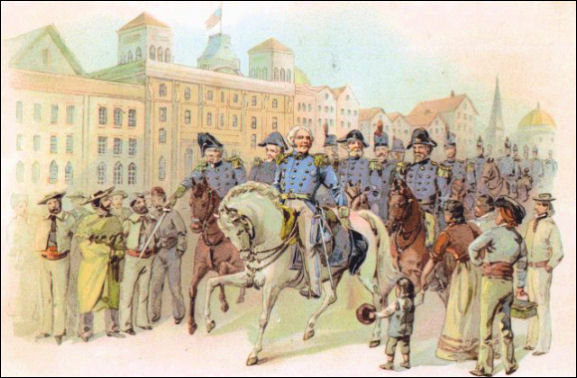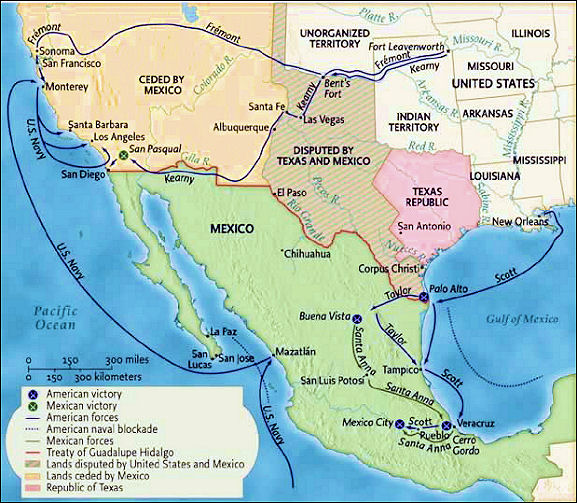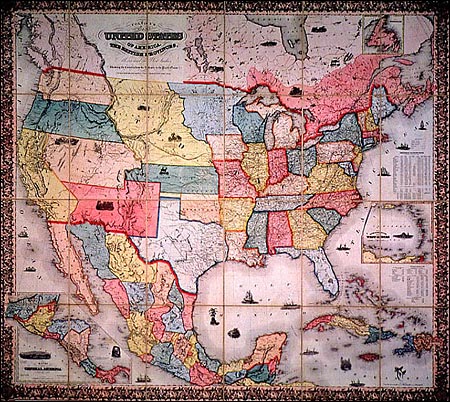Results 1 to 9 of 9
Thread Information
Users Browsing this Thread
There are currently 1 users browsing this thread. (0 members and 1 guests)
-
01-27-2008, 09:25 PM #1

- Join Date
- Jan 1970
- Posts
- 35
Sen. John C. Calhoun Vetoes Annexation of Mexico (1848)
This historical speech arguing against the annexation of Mexico features some politically incorrect ideas as spoken by Sen. Calhoun in 1848, my apologies if this offends any patriots here, this was from the slavery era, however if you can get past that any history buffs here might find this one interesting:

Former VP Warned America Against Trying to Annex Mexico
John C. Calhoun foresaw todayâs problems in 1848
A fact of history unknown to most Americans today is that Congress once debated a proposal to annex all of Mexico. Following the conclusion of the Mexican War in 1848, Mexico, utterly defeated by American forces, was under U.S. military occupation. Expansion-minded lawmakers began to contemplate simply retaining the armyâs conquests and extending our southern border all the way to Guatemala. One who disagreed with this ideaâand whose position ultimately prevailedâwas Senator John C. Calhoun of South Carolina, who had earlier been Vice President of the United States under President Jackson.
Calhoun understood that the acquisition of Mexico would turn America into a multiracial state, fundamentally altering its character. In his speech before the Senate arguing against annexation, he identified both the essence of American nationality and the perquisites for the freedom that Americans enjoyed. As todayâs Americans suffer under the present invasion of Mexican migrants that their leaders refuse to repel, Calhounâs words have special relevance:
Instead of annexing Mexico, the Senate instead ratified the treaty that the State department negotiated with Mexican authorities at Guadalupe Hidalgo. Under the treaty, the United States acquired the southwestern fourth of its present territory, an area that at the time was nearly uninhabited. In return, the United Statesâthe undisputed victor in the war and master of Mexicoârelinquished its control over the that country and compensated the Mexicans for their loss with an indemnity of $15 millionâa huge sum in 1848.â¦The next reason which my resolutions assign, is, that it is without example or precedent, wither to hold Mexico as a province, or to incorporate her into our Union. No example of such a line of policy can be found. We have conquered many of the neighboring tribes of Indians, but we have never thought of holding them in subjectionânever of incorporating them into our Union. They have either been left as an independent people amongst us, or been driven into the forests.
I know further, sir, that we have never dreamt of incorporating into our Union any but the Caucasian raceâthe free white race. To incorporate Mexico, would be the very first instance of the kind of incorporating an Indian race; for more than half of the Mexicans are Indians, and the other is composed chiefly of mixed tribes. I protest against such a union as that! Ours, sir, is the Government of a white race. The greatest misfortunes of Spanish America are to be traced to the fatal error of placing these colored races on an equality with the white race. That error destroyed the social arrangement which formed the basis of society. The Portuguese and ourselves have escapedâthe Portuguese at least to some extentâand we are the only people on this continent which have made revolutions without being followed by anarchy. And yet it is professed and talked about to erect these Mexicans into a Territorial Government, and place them on an equality with the people of the United States. I protest utterly against such a project.
Sir, it is a remarkable fact, that in the whole history of man, as far as my knowledge extends, there is no instance whatever of any civilized colored races being found equal to the establishment of free popular government, although by far the largest portion of the human family is composed of these races. And even in the savage state we scarcely find them anywhere with such government, except it be our noble savagesâfor noble I will call them. They, for the most part, had free institutions, but they are easily sustained among a savage people. Are we to overlook this fact? Are we to associate with ourselves as equals, companions, and fellow-citizens, the Indians and mixed race of Mexico? Sir, I should consider such a thing as fatal to our institutions.
The next two reasons which I assigned, were, that it would be in conflict with the genius and character of our institutions, and subversive of our free government. I take these two together, as intimately connected; and now of the firstâto hold Mexico in subjection.
Mr. President, there are some propositions too clear for argument; and before such a body as the Senate, I should consider it a loss of time to undertake to prove that to hold Mexico as a subjected province would be hostile, and in conflict with our free popular institutions, and in the end subversive of them. Sir, he who knows the American Constitution wellâhe who has duly studied its characterâhe who has looked at history, and knows what has been the effect of conquests of free States invariably, will require no proof at my hands to show that it would be entirely hostile to the institutions of the country to hold Mexico as a province. There is not an example on record of any free State even having attempted the conquest of any territory approaching the extent of Mexico without disastrous consequences. The nations conquered have in time conquered the conquerers by destroying their liberty. That will be our case, sir. The conquest of Mexico would add so vast an amount to the patronage of this Government, that it would absorb the whole power of the States in the Union. This Union would become imperial, and the States mere subordinate corporations. But the evil will not end there. The process will go on. The same process by which the power would be transferred from the States to the Union, will transfer the whole from this department of the Government (I speak of the Legislature) to the Executive. All the added power and added patronage which conquest will create, will pass to the Executive. In the end, you put in the hands of the Executive the power of conquering you. You give to it, sir, such splendor, such ample means, that, with the principle of proscription which unfortunately prevails in our country, the struggle will be greater at every Presidential election than our institutions can possibly endure. The end of it will be, that that branch of Government will become all-powerful, and the result is inevitableâanarchy and despotism. It is as certain as that I am this day addressing the Senate.
But, Mr. President, suppose all these difficulties removed; suppose these people attached to our Union, and desirous of incorporating with us, ought we to bring them in? Are they fit to be connected with us? Are they fit for self-government and for governing you? Are you, any of you, willing that your States should be governed by these twenty-odd Mexican States, with a population of about only one million of your blood, and two or three millions of mixed blood, better informed, all the rest pure Indians, a mixed blood equally ignorant and unfit for liberty, impure races, not as good as Cherokees or Choctaws?
We make a great mistake, sir, when we suppose that all people are capable of self-government. We are anxious to force free government on all; and I see that it has been urged in a very respectable quarter, that it is the mission of this country to spread civil and religious liberty over all the world, and especially over this continent. It is a great mistake. None but people advanced to a very high state of moral and intellectual improvement are capable, in a civilized state, of maintaining free government; and amongst those who are so purified, very few, indeed, have had the good fortune of forming a constitution capable of endurance. It is a remarkable fact in the history of man, that scarcely ever have free popular institutions been formed by wisdom alone that have endured.
It has been the work of fortunate circumstances, or a combination of circumstancesâa succession of fortunate incidents of some kindâwhich give to any people a free government. It is a very difficult task to make a constitution to last, though it may be supposed by some that they can be made to order, and furnished at the shortest notice. Sir, this admirable Constitution of our own was the result of a fortunate combination of circumstances. It was superior to the wisdom of the men who made it. It was the force of circumstances which induced them to adopt most of its wise provisions. Well, sir, of the few nations who have the good fortune to adopt self-government, few have had the good fortune long to preserve that government; for it is harder to preserve than to form it. Few people, after years of prosperity, remember the tenure by which their liberty is held; and I fear, Senators, that is our own condition. I fear that we shall continue to involve ourselves until our own system becomes a ruin. Sir, there is no solicitude now for liberty. Who talks of liberty when any great question comes up? Here is a question of the first magnitude as to the conduct of this war; do you hear anybody talk about its effect upon our liberties and our free institutions? No, sir. That was not the case formerly. In the early stages of our Government, the great anxiety was how to preserve liberty; the great anxiety now is for the attainment of mere military glory. In the one, we are forgetting the other. The maxim of former times was, that power is always stealing from the many to the few; the price of liberty was perpetual vigiliance. They were constantly looking out and watching for danger. Then, when any great question came up, the first inquiry was, how it could affect our free institutionsâhow it could affect our liberty. Not so now. Is it because there has been any decay of the spirit of liberty among the people? Not at all. I believe the love of liberty was never more ardent, but they have forgotten the tenure of liberty by which alone it is preserved.
We think we may now indulge in everything with impunity, as if we held our charter of liberty by "right divine"âfrom Heavan itself. Under these impressions, we plunge into war, we contract heavy debts, we increase the patronage of the Executive, and we even talk of a crusade to force our institutions, our liberty, upon all people. There is no species of extravagance which our people imagine will endanger their liberty in any degree. But it is a great and fatal mistake. The day of retribution will come. It will come as certainly as I am now addressing the Senate; and when it does come, awful will be the reckoningâheavy the responsibility somewhere!
Sen. John C. Calhoun 1848
Additional:
Images of the U.S.-Mexican War
An Interesting U.S.-Mexican War Website
Gen. Scott hoists Old Glory over National Palace of Mexico
Franklin Pierceâs Journal on the March from Vera Cruz
Descendants of Mexican War Veterans Website
Gen. Winfield Scottâs Entrance into Mexico City Sept. 1847

The Mexican-American War 1846 -1848

Map of the United States & Mexico following the war

-
01-27-2008, 09:29 PM #2Banned

- Join Date
- Dec 2007
- Posts
- 3,753
I'll not comment further than to say
Interesting
Of course I'm a history buff and sadly a lot of history is
pc and very off limits
-
01-27-2008, 09:49 PM #3Senior Member

- Join Date
- Jan 1970
- Posts
- 784
RememberGoliad thanks for posting this. The funny thing is that the arrogant Mexican military expected to win the conflict and it is fair to say they have been fighting the US every since.
The compensation (or stabalization fund) was squandered in corruption and political battles.
-
01-27-2008, 10:12 PM #4

- Join Date
- Jan 1970
- Posts
- 771
The truth is that the ""la raza"" in mexico took the land from redskinned indians.I do not like the word stolen because in almost every instance through out history territories were taken from others and in most instances because one side lost a war that in some instances they started.
-
01-27-2008, 10:36 PM #5

- Join Date
- Jan 1970
- Posts
- 35
That reminds me a while back I spent a few nights reading up on Mexican history and wrote an article (since fallen off the internet), made up mostly of interesting factoids, one story I ran across was that in 1829 the soldiers at Monterey California went on strike for not being paid in TWELVE YEARS! Originally Posted by Chosen
Originally Posted by Chosen
The Reconquista crowd would have us believe that Mexico's Northern frontiers were some kind of paradise but truth be told their wasn't a paved road, school, or even a pier built anywhere.
Monterey was the big town and capitol of California, in 1845 the census registered a whopping 810 people with a good percentage of those being American by then -
Interesting account in English of life in Mexican California circa 1835:
Richard Henry Dana, Jr. (1815â1882)
Two Years before the Mast
http://www.bartleby.com/23/1.html
-
01-27-2008, 10:59 PM #6

- Join Date
- Jan 1970
- Posts
- 35
If memory serves me correctly the Mexicans got hammered by the Indians and were only a small minority in the land. In Arizona they had two precedios that they eventually had to abandon, in California they had 4 precedios, the Russians had one, the overland trail to California was cut off for some 30 years due to hostile Indian attack the only way anyone could travel there was by boat. They were able to hold New Mexico successfully though - Originally Posted by DHolmes7
Originally Posted by DHolmes7
-
01-28-2008, 01:46 AM #7Near where I live there is an old restored Spanish Mission. When Mexico defeated Spain in 1821 they kicked out the Spanish soldiers and priests and replaced them with nobody. The local Indians took back control of most of the area, and the Mission began to fall into ruin. In fact Indians controlled 99% of "North Mexico", Mexico never controlled the area all they did was stamp their name on a map.
 Originally Posted by RememberGoliad
Join our efforts to Secure America's Borders and End Illegal Immigration by Joining ALIPAC's E-Mail Alerts network (CLICK HERE)
Originally Posted by RememberGoliad
Join our efforts to Secure America's Borders and End Illegal Immigration by Joining ALIPAC's E-Mail Alerts network (CLICK HERE)
-
01-28-2008, 01:59 AM #8
Re: Sen. John C. Calhoun Vetoes Annexation of Mexico (1848)
This is one fact the reconquistas always ignore. They have this fantasy that the Southwest was once Aztlan, and that Mexico claimed the area for 25 years. But they never say anything about ALL of Mexico being part of the US for at least one year! And we could have kept it. Originally Posted by RememberGoliad
Originally Posted by RememberGoliad
I think now since Mexico is violating the treaty of Guadalupe Hidalgo all over the place, we have every right to re-posses it and should, not as normal US territory where Mexicans would have US citizenship, but as a trust territory to ensure they have a functioning economy and personal rights. Obviously Mexicans cannot run the place, they whine what will they do if their citizens illegally in the US come back!Join our efforts to Secure America's Borders and End Illegal Immigration by Joining ALIPAC's E-Mail Alerts network (CLICK HERE)
-
01-28-2008, 06:41 PM #9
Thanks. That has a lot of good quotes about self-government. A priceless thing that many would foolishly give away.
Also another fact: During revolutions countries sometimes lose territory. This happened with certain American colonies' claims after 1776. So it should not be a surprise that when Mexico revolted against Spain they lost territory that Spain had originally claimed. As far as the Native Americans' concerns they are much better under US government than they would have been under Mexican."Men of low degree are vanity, Men of high degree are a lie. " David
Join our efforts to Secure America's Borders and End Illegal Immigration by Joining ALIPAC's E-Mail Alerts network (CLICK HERE)


 LinkBack URL
LinkBack URL About LinkBacks
About LinkBacks




 Reply With Quote
Reply With Quote

Oklahoma House passes bill making illegal immigration a state...
04-19-2024, 05:14 AM in illegal immigration News Stories & Reports